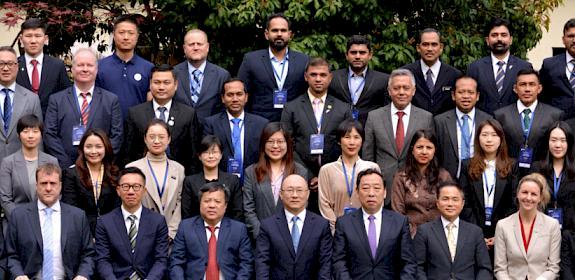Thorough investigations needed following major rhino horn seizures in SE Asia
Ha Noi, Viet Nam, 23rd March 2017—Viet Nam continues to take centre stage in the global illicit rhino horn trade in 2017 with two large, back-to-back seizures totalling 67 horns in Southeast Asia that reaffirm the country’s links to rhino horn consumption and trafficking.
Update, 31st March 2017: According to Customs News, an official channel for Vietnamese Customs, of the 46 rhino horns seized in Viet Nam on 14th March only five were tested by the Institute of Ecology and Biodiversity Resources (the CITES Scientific Authority in Viet Nam). Four are confirmed to be White Rhino horns and one is from a Black Rhino. TRAFFIC urges Vietnamese officials to take samples from all 46 horns and send them to RhODIS, the Veterinary Genetics Testing Lab in South Africa, so that standardized testing can determine the species and origin of these horns.
In the first seizure on 10th March, Thai Customs discovered 21 rhino horns in luggage that arrived in Bangkok’s Suvarnabhumi Airport on a flight from Nairobi. One of two female suspects who had travelled to Bangkok to collect the bag, had come from Viet Nam.
Both women fled while the luggage was being searched. Warrants have been issued for their arrest. The two police officers and a senior official from the Ministry of Justice, who were reported to have escorted the women with the rhino horn-laden luggage, are all under investigation.
Days later a seizure of 46—more than 100 kg—of rhino horns took place in Viet Nam at Hanoi’s Noi Bai International Airport. Authorities discovered two suitcases on a flight from Kenya containing 57 kg and 61 kg of rhino horns. Customs officials who discovered the two bags were unable to trace the contraband back to any traveller.
The forensic testing of rhino horn is a requirement under the Convention on International Trade in Endangered Species of Wild Fauna and Flora (CITES) to which Viet Nam and Thailand are both signatories. While Thai authorities have announced plans to sample DNA from horns seized in Bangkok to determine their origin, it remains uncertain if Vietnamese authorities are intending to do the same for the Hanoi seizure, despite the CITES requirement. Their reluctance may be linked to an incident last year when rhino horns sent for sampling by Viet Nam were reportedly stolen en route to South Africa from the luggage of a Vietnamese official.
Investigations following enforcement actions like these often come to a dead end when officials are unable to trace the origin of the contraband, or when concealed shipments of high-valued commodities such as ivory, rhino horn and pangolin scales are tracked back to shell companies. Traffickers higher up in the trade chain are seldom found and those detained are often low-level smugglers. The situation is made worse by a weak legal framework and poor prosecution rates: according to a 2015 report by the United Nations Office on Drugs and Crime (UNODC), Viet Nam currently successfully prosecutes less than 1% of criminals involved in wildlife crime.
We urge Viet Nam to pursue forensic testing and investigations into seizure cases to help track the origins of wildlife products and show up links in wildlife crime networks. Such actions demonstrate international commitment towards tackling the trafficking menace
Madelon Willemsen, Head of TRAFFIC’s Viet Nam OfficeAttacks on rhinos have not abated this year which has seen an upsurge in poaching in the KwaZulu Natal region of South Africa. Forensic DNA testing is vital in determining the provenance of horns and if they originated from recent poaching incidences such as these.
Although some African nations reported a slight drop in rhinos poached in 2016, conservationists say the crisis continues with an average of three rhinos lost to poachers every day and South Africa’s rhino population is now experiencing population decline.
“TRAFFIC hopes these two important cases don’t just fade away after the seizure,” said Chris Shepherd, TRAFFIC's Regional Director for Southeast Asia.
“We want to see Viet Nam, Kenya and Thailand pursue collaborative investigations into all possible parties involved along the trade chain—for example, how did such large consignments of horns elude the authorities in Africa? Identifying those behind these shipments and holding the criminals to account will ensure this won’t be a viable business for them to be engaged in.”




